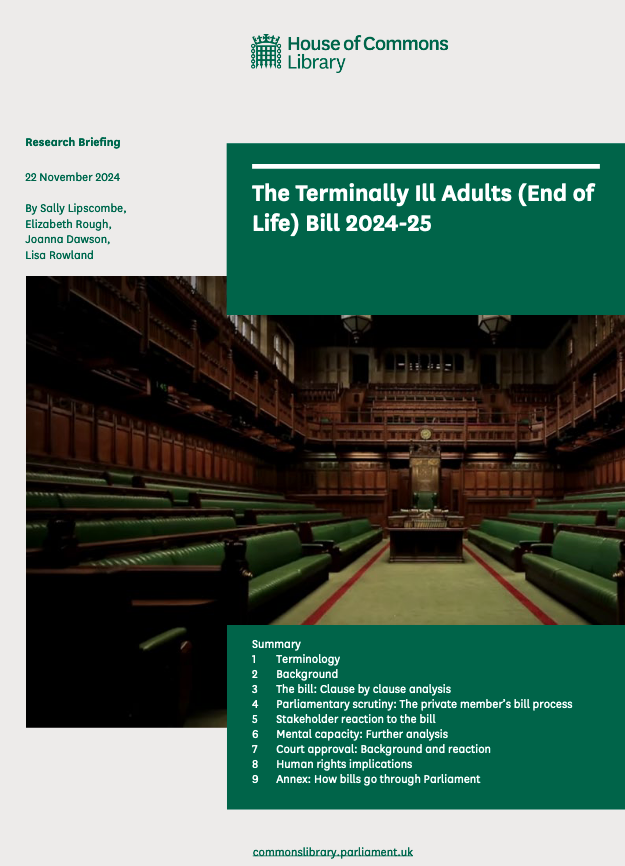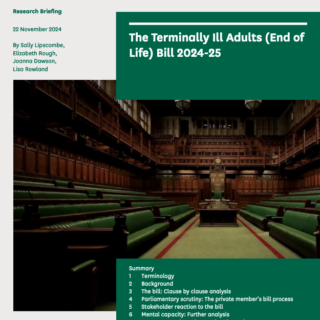This week, MPs will get their first opportunity to vote on what is quickly becoming the most controversial issue of this Parliament: assisted dying.

“Assisted dying” refers to two different things: physician-assisted suicide and voluntary euthanasia. In the former, a doctor prescribes lethal drugs which are then self-administered while in the latter, a doctor administers a lethal dose to a patient with their consent. Currently, the law prohibits both (though CPS prosecution guidelines advise against pursuing cases in all but the most serious cases). Doctors who practice voluntary euthanasia would be liable for murder while assisted suicide is an offence under the Suicide Act 1961. The new bill seeks to legalise assisted dying for people who have less than 6 months left to live and whose quality of life falls below a certain standard.
There are interesting and substantial arguments on both sides of the debate, but the bill that is currently going through Parliament is interesting for two procedural reasons. First, it is a private members’ bill, meaning that it is not sponsored by the government. Second, voting will be ‘free’, meaning that political parties will not ‘whip’ their MPs to vote one way or another (at least, not officially).
In this case, the two procedural oddities have a common cause. Assisted dying is seen as an issue of conscience, along with other start/end-of-life issues like abortion and the death penalty. It is seen as inappropriate for the government to take a side one way or another (though members of the government can have strong views in their capacity as MPs) and so the convention is that any bill changing the law on one of these issues is introduced by a backbencher and not by a government minister, and once it has been introduced, neither the party in power nor any of the opposition parties take official stances.
It is an interesting question why these issues in particular are ‘issues of conscience’ and why on these issues in particular MPs are permitted to vote as they see fit. Other votes which are very heavily whipped — budgets, war, etc. — are arguably much more consequential and their consequences are no less significant. That is, they can also be matters of life and death. One might hope that MPs always vote with their conscience, indeed a system which assumes that most of the time MPs should be ‘whipped’ so that they don’t vote according to what they think is in the best interest of the country seems like a system which is fatally flawed. Nevertheless, it is the system we have got.
Private Members’ Bills can be introduced in three ways. There are so-called ‘Ten Minute Rule’ bills. On Tuesdays and Wednesdays, one MP is allowed to make a speech of no more than 10 minutes making the case for introducing a new bill. One MP who opposes the introduction of the bill is allowed a right of response (also limited by convention to 10 minutes). The House then votes on whether or not to proceed with first reading. Ten Minute Rule bills rarely make it onto the statute books.

The second way to introduce a Private Members’ Bill is by ‘presentation’. Any MP can present a bill to Parliament, and choose a day for second reading (it has to be one of the 13 Fridays per session set aside for Private Members’ Bills). These bills then go to the bottom of the order paper for that day, and time rarely permits their making any further progress.
The third way to introduce a Private Members’ Bill, which is how Kim Leadbeater MP introduced the Assisted Dying Bill, is to apply for the ballot. Every year, 20 numbered balls are drawn, bingo-style, from a plastic tub and if an MP’s number is chosen, they are given priority to introduce a bill of their choice to Parliament. Leadbeeater came top of the ballot, and so the Assisted Dying Bill is the first Private Members’ Bill to be debated this year.
This means that there will be time set aside for a debate in the House of Commons on the bill, but not as much time as there would be if it were sponsored by a government minister. This has already caused some controversy, as some MPs think that the gravity of the subject-matter merits more time for consideration than current procedures allow. Leadbeater’s response to this has been to encourage MPs who are still on the fence to vote for the bill at second reading and reserve the right to vote against it when it returns to the House of Commons after the committee stages.

This might provide a practical solution for those who want more time to make up their mind, but it is hardly a principled one. It would give the appearance of the bill having more support from MPs than it actually does. There is a risk that an important bill gains momentum more through indecision than through persuasion.
So much for procedure — the House will consider the substance of the issue on Friday, after which a vote will take place. With no formal whipping operation, it is very hard to tell which way the vote will go. There are MPs on both sides of the debate who make passionate and persuasive arguments. They will be determined to win over those of their colleagues who are still on the fence. The stage is set in Parliament for what could be a decisive moment in the moral history of the nation.
Hugo Williams is a GDL student and intends to pursue a career as a barrister. He read Philosophy as an undergraduate at Cambridge and did post-graduate work at UCL, focusing on the relationship between intention and moral culpability. Hugo also has a long-standing interest in the law governing the start and end of human life. On the weekends, he can often be found at the console of pipe organs around London or perusing a second-hand bookshop.

